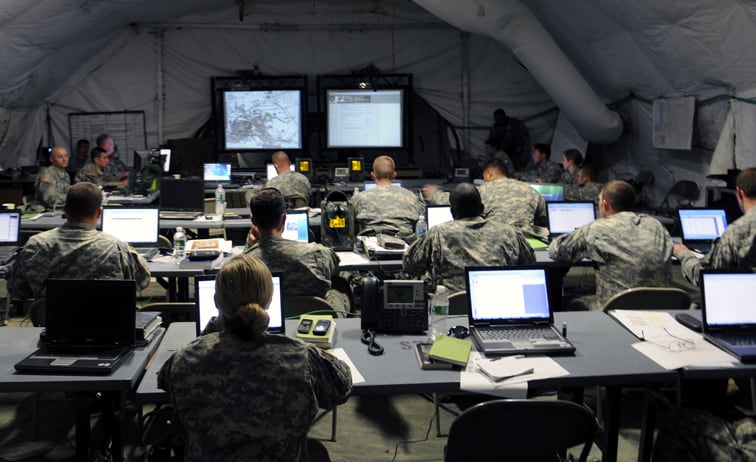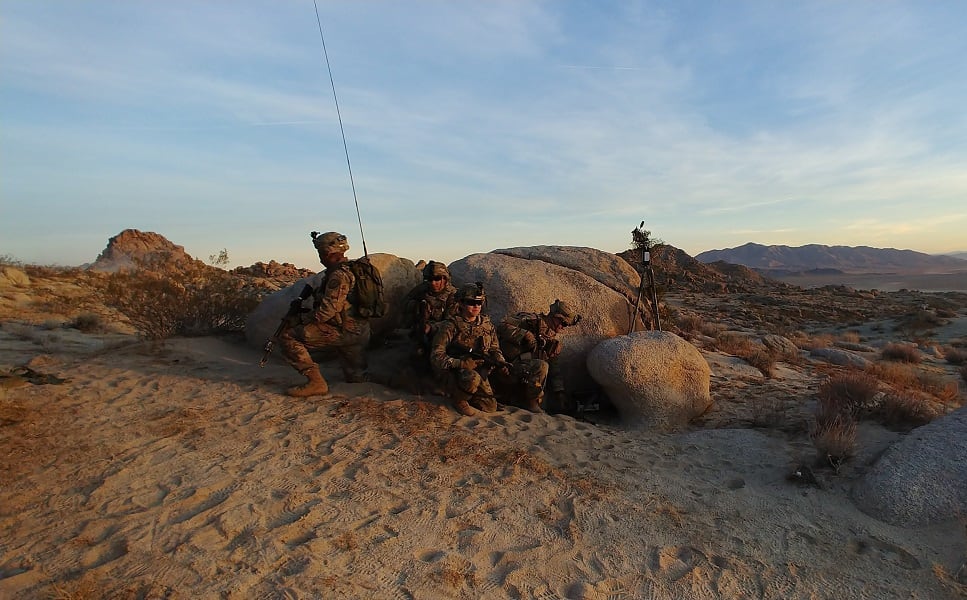Army Cyber Command is already operating below the threshold of armed conflict every day, and that necessitates some changes to how it’s allowed to work, according to its leadership.
The command is increasingly operating in the information environment, including fighting disinformation from sockpuppet accounts on social media. However, the authorities that the command operates under are sometimes held at too high a level and are too centralized, Brig. Gen. Richard E. Angle, Army Cyber’s deputy commanding general, said Monday
“It’s 2019. It still can’t be true that it’s easier to drop a bomb on somebody than to send them a leaflet or an email, but in many cases that is true," Angle said at a panel discussion in Washington, D.C. “We need to get to a place where we have message release authority, where our commanders on the ground — like how they can call in fires to support their element — can release a message into the information environment.”
Changing authorities around has its risks, particularly when it comes to junior leaders taking on more responsibility, but not engaging in the information space at all risks ceding it to adversaries, according to Angle.
Commanders need to be able to “underwrite that risk," so that junior leaders are able to make mistakes and continue to operate, Angle added.
Army Cyber has lobbied for a name change to Army Information Warfare Command in recent months, as well. It’s part of a growing realization that the outfit’s mission is shifting.

“On a daily basis, we’re not just being asked for some technical capability, we’re being given commander’s intent. We’re given broad tasks,” Lt. Gen. Stephen G. Fogarty, who helms Army Cyber Command, said at the event Monday. “We are operating in the information environment, maneuvering in the information environment, every single day.”
“And sometimes, the best thing I can do on the cyber side is actually to deliver content, deliver a message," Fogarty added. "Maybe the cyberspace operation I’m going to conduct actually creates some type of [information operation] effect.”
Many information warfare missions are still shrouded under the cover of national security. These types of operations are often cited in relation to Syria and Iraq, where the U.S. military has worked to counter social media accounts used by members of the Islamic State.
However, a cyber operation that more directly impacts American citizens was seen this past election season. During the 2018 midterms, Army Cyber’s parent organization, U.S. Cyber Command, blocked internet access to the Internet Research Agency in St. Petersburg — the Russian troll farm that also engaged in online influence operations during the 2016 presidential election.
Russia is currently the country most involved in offensive information warfare, Darren Linvill, a social media disinformation researcher at Clemson University, said during the panel.

“The thing that scares me is other nations getting involved in that sort of offensive capability," Linvill said.
Countries like China are mostly concerned with disseminating internal propaganda, but that could change. As massive protests in Hong Kong unfolded this summer, Twitter and Facebook both announced that they were taking steps to curtail Chinese government influence operations over their social media platforms.
“Just in the recent Chinese release, one account out of several hundred was clearly aimed at Americans and not talking about things that were of interest to the Chinese, but talking about things that were of interest to Americans,” Linvill said. “That scares me.”
Offensive information operations don’t appear to be targeting individual soldiers, but they are targeting the institution of the Army more generally, according to Col. Gittipong Paruchabutr, who serves as the information operations division chief to Army Special Operations Command.
“Even if it’s not targeting soldier 'X' or unit ‘y,’ these accounts, these online activities are targeting general Americans and it further polarizes our divisions," Paruchabutr said. “If it causes further political division within the units, it has an effect. And we are absolutely cognizant of that and we teach all soldiers within [Army special operations] that these activities are happening.”
Disinformation against U.S. soldiers isn’t unheard of. In June 2018, four U.S. Army Stryker vehicles driving in Lithuania collided when the lead vehicle braked too hard for an obstacle on the roadway.
Not long after the incident, a blog post made to look like a popular Lithuanian news outlet claimed the Americans killed a local child in the collision, using a doctored image of a crushed bicycle and corpse as evidence.
Army Cyber wants to protect “that BCT [brigade combat team] in Poland" or "that SOF [special operations force] team in Ukraine” from disinformation campaigns like that.
"If the Army is a reflection of society and the Russians are doing identity-based targeting, well then they’re targeting our folks,” Angle said. “It’s happening and we got to do a better job of defending our soldiers.”
Kyle Rempfer was an editor and reporter who has covered combat operations, criminal cases, foreign military assistance and training accidents. Before entering journalism, Kyle served in U.S. Air Force Special Tactics and deployed in 2014 to Paktika Province, Afghanistan, and Baghdad, Iraq.





